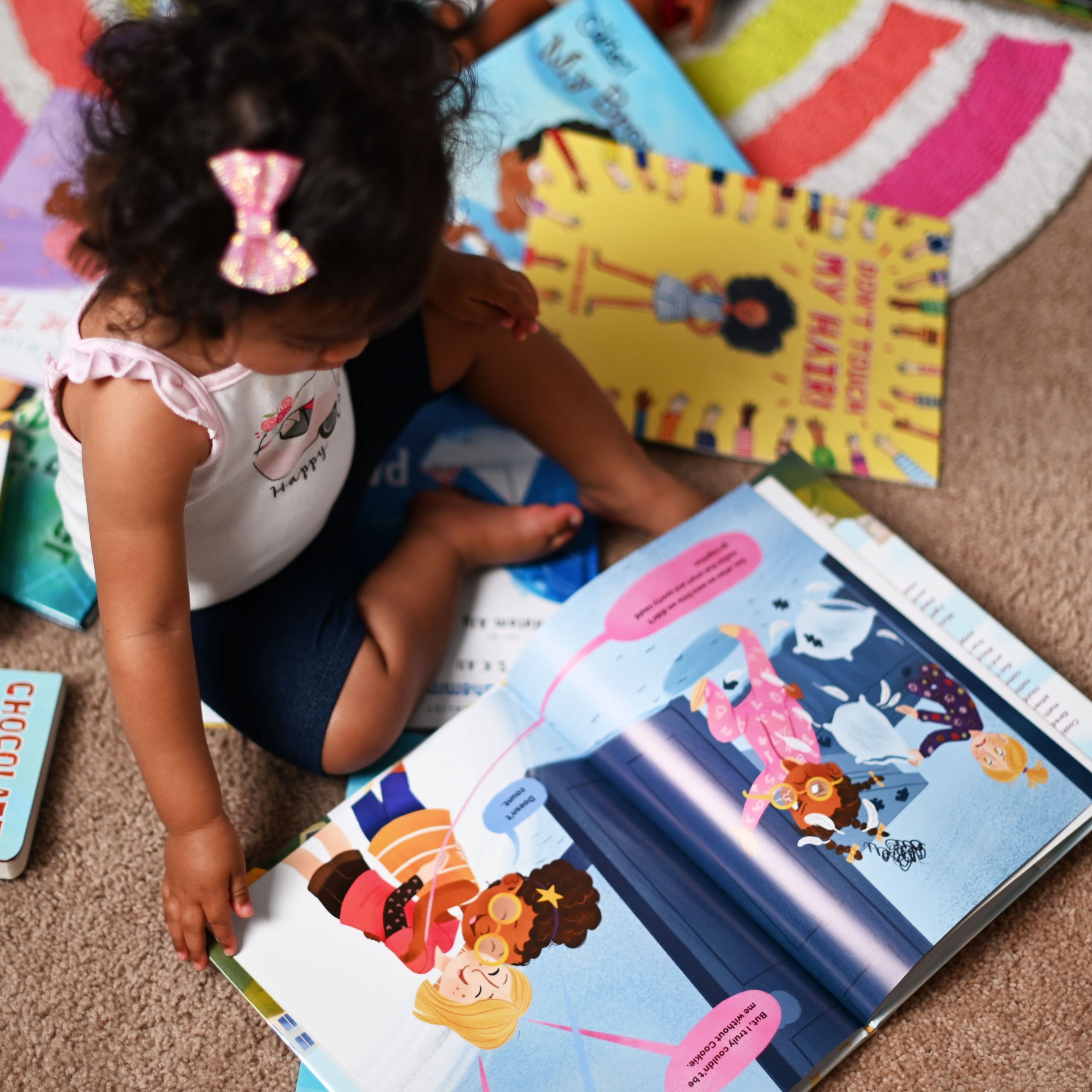
In the modern age that promotes social justice and racial equity, representation in media is something that has been emphasized for the self-esteem of our children.
But even still, many of the stories seen in fiction — whether it be in movies, TV shows, or books — are ones driven by white or non-human characters.
The Reed family, consisting of mother Stephanie, father Muammar, and 19 month old daughter Mireya have taken center stage in this discourse through their new, online resource.
MiJa Books is an online resource that focuses on stories with black, brown, and Asian characters. The website — mijabooks.com — hosts both reviews of several hundred books as well as an online bookstore and links to purchase some of the books they can’t directly sell.
“For technical reasons, some of the books may not be purchase fulfilled, so we offer an affiliate link to purchase the books through Amazon or bookshops.org,” mother Stephanie Reed explains. “But we have reviewed close to 200 books.”
The seeds for MiJa Books were planted by an unfortunate source: struggles due to COVID-19. Reed’s first business is called Senior Sensory, which focuses on keeping seniors sharp and active through various stimulating activities, and it took a major hit as lockdowns became the norm.
“We actually started [MiJa Books] out of necessity,” Reed remembers. “I lost over 90% of my customers at my primary business due to COVID, and building my daughter’s home library was just something that my husband and I wanted to do.”
The name comes from the Spanish word for ‘daughter’ and an amalgamation of the name of their daughter — Mireya Jamila. At that point, the Reeds only had a couple dozen books for their daughter’s library, so Stephanie decided to write reviews of some of these books and compile them.
“MiJa Books started with me posting reviews of the books that we found for her specifically,” she said.
These were not just ordinary books. They were very particular in that the stories needed to feature black and brown characters.
The first hiccup in the business came early in the form of supply, but it was the difficulty in finding these minority driven stories that also opened up an avenue for the Reed’s to truly establish MiJa Books as what it is today.

“Honestly, the first books that we collected, we walked into the Barnes and Noble, the Targets, and even the Costcos looking for black and brown and Asian characters on the cover,” Reed remembered.
“All the ones that we could find, we grabbed when we could find them; we struggled with that. In searching for these kinds of books, I knew that other families and educators were having the same issue. I told myself that I couldn’t be the only one who was having this problem, and so I thought that just putting up reviews on our website would help parents and education.”
But just writing reviews doesn’t pay the bills, so the Reed family came up with a way to monetize their service while helping fulfill a need that they had personal experience with: selling these hard-to-find books in their own bookstore.
“I had to make a pivot from my first business, so my husband and I were talking about how to create a new business, Reed said.
“We had the idea of actually becoming an independent book store so that these books can be out in bookshelves in homes and schools around the world.”
For Stephanie, the importance of having characters that look similar to the kids reading it goes back to her own childhood, and the importance of a particular book she owned herself.
“When I think back to my childhood, there’s only one book that I can recall with someone that looked like me,” she recalled. “It was a bilingual book, and it was a book that I cherished because it was the only one that I knew of as a girl. I had this connection to the story where I could relate to the characters.”
“If we really are using children’s book so that children can build their self esteem, so they can learn morals and values, I think the best way you can do that is having characters that look like them and sound like them versus trying to convey that object through a character that is an inanimate object.”
Muammar shares a similar sentiment, saying that he thinks that he would have read more as a kid not just as a means to an end, but as something to enjoy.
Once MiJa Books became the focus of Stephanie and the Reed family’s lives, the site quickly expanded as they became more familiar with the ins and outs of finding these particular books.
“I went on a deep dive search online,” Reed told the News. “I was trying to be more specific with internet searches looking for books with Mexican characters, or books with black and brown families and things like that.”
Now, MiJa books has nine primary categories that include books with a female-lead of color, books focused on families of color, books focused on natural hair, and STEM children’s books with leads of color. They also feature Spanish language books, which Stephanie attests also face similar issues.
“A lot of the Spanish language books that we carry are from the major publishing houses, and some of these books are super popular. But big box retailers just aren’t purchasing them,” Stephanie lamented.
As the site began to grow, the Reeds were opened up to a brand new world. While the start of the site had the family desperately searching for books, its growth caught the eyes of independent publishers and authors who are self-published. She also began to focus on a resource she was getting a grasp of: social media.
“In the beginning, I was reaching out to pages that I found on social media. As we slowly started building our followers and presence on Facebook and Instagram, Reed recalled.
“I now have authors reaching out to us asking ‘how can I get featured on your website?’ or ‘how can I get featured on your social media?’”
“So it has been a sort of little universe that we have uncovered in the indie and self publishing world, because sadly, big box retailers don’t even look at independent and self published authors.”
Suddenly, MiJa Books found itself serving another unique need: serving as a platform for these independently published authors to spread their message.
“They see we created a platform that embraces their work and that we really value what they are providing, so I think when people go to our website and they see what we’re doing on social media, they really have a connection to our mission.”
While the original focus of the site was on children’s books, it has naturally expanded outwards to older age groups, particularly through graphic novels.

“It was actually something that came naturally; it was someone who reached out to me who does graphic novels for teenagers, Reed explained. “She created Latina superheroes and she found us through social media. I loved what she was doing; we kind of shared the same mission, so to support her, I bought some books to feature on our site.”
As MiJa Books continues to look ahead, the site hopes to work with schools to get some of these books on the shelves. From March 1 to March 13, the Culver City Parent-Teachers Association is hosting a fundraiser for MiJa Books, with Muammar’s law firm, Reed & Garcia Law, providing a matching donation.
By using code CCPTA on the mijabooks bookstore during that time, 10% of the proceeds raised from a purchase will go towards establishing a base of minority driven books in Culver City School bookshelves.
“We don’t know the response that we will get, but it is an angle that we are using to promote our brand. We are using proceeds to actually purchase books for classrooms, and PTA’s have been really excited to get this started.”
